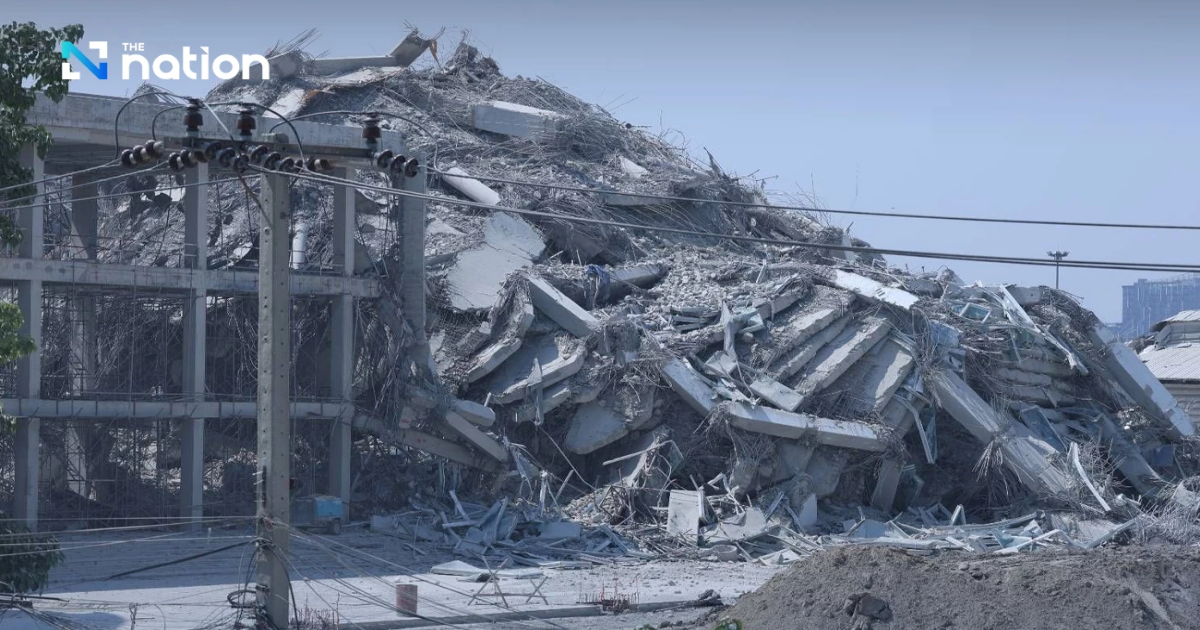As for preventing engineering-related corruption during construction, such as design changes or delays, the responsibility lies with the SAO and the construction firm to ensure the contractor adheres to the contract.

Disaster Warning System Failure
Another major failure highlighted was Thailand’s disaster warning system. Alarmingly, more than 24 hours after the earthquake, many people only received their first earthquake alert from the Department of Disaster Prevention and Mitigation (DDPM), causing confusion and panic as people thought another earthquake had occurred.
On March 29, during a meeting to address the situation, Prime Minister Paetongtarn Shinawatra pressed for urgent improvements in the warning system, instructing the DDPM and the National Broadcasting and Telecommunications Commission (NBTC) to resolve the SMS delay and ensure more timely alerts. The meeting was attended by Deputy Prime Minister Anutin Charnvirakul, Digital Economy and Society Minister Prasert Jantararuangtong, Transport Minister Suriya Juangroongruangkit, and other relevant agencies.
Paetongtarn stated that the main issue is the delay and lack of coverage in the SMS disaster alerts sent to the public. She emphasized that the problem needs immediate resolution, particularly by coordinating with major mobile operators like AIS and True to improve the reach of the alerts. She also mentioned that social media channels, such as Facebook, are being utilized, and she urged the NBTC and DDPM to collaborate in ensuring foreigners who purchase Thai SIM cards receive timely alerts as well.
She noted that despite the delay, the information sent wasn’t very useful, and acknowledged that she should have specified what information should be included in the alerts. She thanked television programs for their quick response in broadcasting updates within five minutes of receiving the information. While she didn’t feel the earthquake’s impact in Phuket, she was able to act swiftly after receiving reports and issuing orders.
Paetongtarn highlighted the need for improvement in the SMS system, mentioning the Cell Broadcasting Service (CBS) as a possible solution. She also shared her personal confusion about how to respond during an earthquake, as she isn’t used to living in a seismically active country, noting that more education on earthquake preparedness is necessary.
Lastly, she discussed post-disaster transportation issues, with many people unable to return home due to disruptions in BTS and train services. She stressed the need for SMS notifications to inform the public about transportation updates, road closures, and accident locations during major incidents.
Phasakorn Boonyalak, the Director-General of DDPM, clarified that the DDPM works closely with the Meteorological Department to monitor earthquakes and receive real-time reports. These reports are then sent to the NBTC to issue alerts. He explained that earthquakes are unique in that they cannot be predicted, and the first alert was sent at 2.42pm, advising people to enter buildings only if necessary due to the aftershocks. Subsequent alerts were issued at 4.07pm, 4.09pm, and finally, at 4.44pm, informing the public that it was safe to re-enter buildings.
Trairat Viriyasirikul, the Deputy Secretary-General of the NBTC, explained that following the earthquake, television and amateur radio stations were put on standby 24/7. As for mobile phones, operators are working on improving the system to send more SMS alerts. He mentioned that the Cell Broadcasting System (CBS) might be a potential solution, but it’s still under development.
He further explained that the NBTC sent SMS alerts starting at 2.44pm, but only managed to reach 100,000 to 200,000 numbers at a time. The CBS system was introduced in July 2023 and is not fully functional yet. In the first hour after the earthquake, the NBTC gradually sent SMS messages to over 10 million numbers, sending messages to around 200,000 numbers at a time. They also contacted True and AIS networks, which reported that they were trying to send messages to as many people as possible in one go. However, sending SMS to over 3 million numbers could take up to 5-6 hours. The SMS alerts covered Bangkok and four other provinces.
